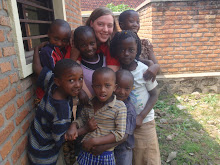They warned us about it in training. The dreaded “Cycle of Adjustment”. It’s the emotional ups and downs that pretty much everyone goes through when they move to a culture much different than their own. Did I ever think that I could somehow avoid it? Hell no. But did I think my life would actually mirror the Cycle of Adjustment chart that they included in our health manual? Not particularly. And yet, here I am, 8 months into my 27 months in Rwanda, and like clockwork I can map my experiences and feelings to this tattered piece of paper in the back of a notebook.
The beginning is the honeymoon phase, the initial euphoria that accompanies arriving in a new country: meeting new people, having new experiences, learning a new language, a new culture and a new way of living. I lived it, I loved it. Everything about Rwanda was beautiful and intriguing; everyday brought a new adventure, a new story.
This “high” followed me from training in Nyanza to my site in Musanze. I setup my house, determined to make it a home. I explored my new town, wandering into store after store and greeting everyone I passed on the street. I made new friends, both Muzungu and Rwandan, and shared incredible experiences, from hiking up a mountain, to attending a baptism, to doing yard work together. I worked hard at my job, going to health center after health center, attempting to understand how they worked and where I would fit in. I experimented with cooking and patted myself on the back every time I successfully created another culinary masterpiece on my simple kerosene stove. I laughed my way through everything, including the communication and cultural barriers, and mistakes I made while completing such simple tasks as washing my clothes, cleaning my house and paying my electricity bill. I let my neighborhood kids visit often, even if it only resulted in them jabbering away to me in Kinyarwanda while they climbed my avocado tree and posed for photos. I was wide-eyed and overwhelmed, but busy and content.
Then it hit me. Right between months 5 and 6. Culture shock. And it hit me like a ton of bricks. Suddenly it felt as if my primary activities were eating, sleeping, movie watching and reading. I followed my boss around on health center visits like a sad puppy, unable to understand what was being said or what he was doing, let alone what I should be doing. I felt like I couldn’t speak a word of Kinyarwanda, and understood even less. I avoided the food market like the plague, and attempted to make my visits as short and embarrassment-free as possible, which meant greeting people but not lingering (since lingering meant actually having to fumble through a conversation in Kinyarwanda) and probably paying more for food than I ever should have. I told my neighborhood kids I was busy despite not having anything to do, and often hid in my house when I heard someone knock on my gate. This mood coincided with my largest intake of macaroni and cheese and chocolate to date. Vegetables? I’m not sure I knew what those were. I didn’t want to leave my house, but could barely stand the guilt I was feeling by staying in my house. Reading the symptoms of culture shock was like checking off a grocery list of my emotions: homesickness, boredom, withdrawal, oversleeping, overeating, irritability (did I mention I had the desire to hit a child? More than once.), loss of ability to work effectively. Check, check, check! Of course, all of this was compounded by the fact that I was taking the anti-malarial medication Mefloquine, which I’m fairly certain was slowly making me go insane (can you say hallucinations?!).
And then, almost overnight (or more like about two weeks after I switched malaria meds) things changed again. This time for the better. Much better. Work began to pick up, as I conducted data management activities and started writing grants to bring running water to health centers lacking it. The books arrived for the library and I spent days cataloguing, sorting and planning science experiments for the library’s future “Science Days”. I once again made a conscious effort to greet strangers and visit friends I’d been neglecting. I went to the market far more often, forcing myself to stop and talk to the vendors, to the point where people smile and wave when they see me, know my name, and give me extremely fair prices on their food (and even sometimes give me free things!). I let the kids enter my gate once again and we’ve spent numerous visits singing and dancing, drawing pictures and making Play-Doh animals, jumping rope and teaching each other games. I began cooking again, giving up mac&cheese out of a box for spicy curries and homemade chapatti. One of the biggest differences came when I realized I was beginning to really understand and speak Kinyarwanda. I was having conversations with my neighborhood kids and even asked a pharmacist to switch from speaking French to Kinyarwanda because I could understand more of it.
So yes, I guess I’m on the “upswing” as they say. I’m finally feeling at home here, finally beginning to feel accepted by my neighbors, colleagues and community. I’m positive, I’m healthy, I’m busy, and I’m motivated. I have so many things to look forward to, especially Thanksgiving with my Musanze family and a visit from my American family over the Christmas holiday. 8 months down, 19 to go. The cycle of adjustment says months 12-14 are the absolute worst, so stayed tuned. Until then, I’ll be here at the high point, enjoying life “mu Rwanda”.
Subscribe to:
Post Comments (Atom)
Be the change you want to see in the world.
-Mahatma Gandhi

1 comment:
Here's to upswing's......!
Post a Comment